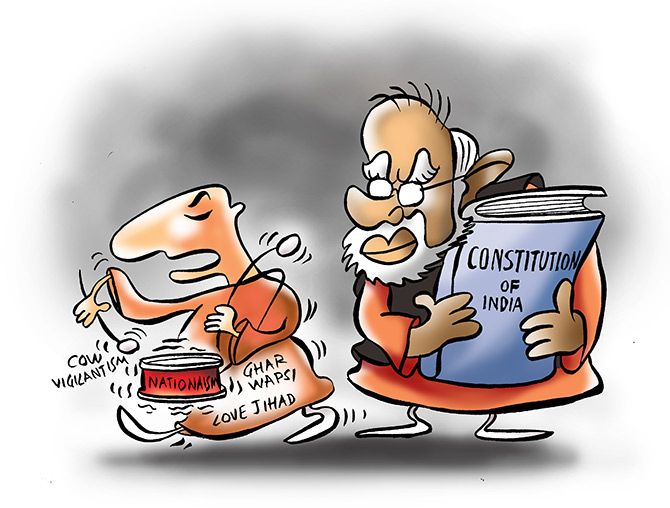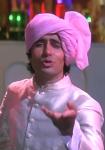'Since the goal of taking everyone along on the path of development -- sabka saath sabka vikas -- requires an atmosphere of amity, there cannot but be an emphasis on the primacy of law and order -- and it cannot be only against road-side Romeos or gutka chewers,' says Amulya Ganguli.
Illustration: Uttam Ghosh/Rediff.com

The saffron camp's rationalisation of Yogi Adityanath's rise -- and of Narendra Modi's -- is to equate vikas with Hindutva.
According to it, there is no contradiction between the two because the Sangh Parivar's ideal is an economically powerful and militarily strong India, which can only be achieved through development.
As a blogger has said, India has emerged from 1,200 years of slavery under Muslim and British rule and is now marching to a 'nationalistic drumbeat orchestrated by strong leaders.'
So far, so good.
While there can be no quarrel with India's progress as a result of vikas, what the saffron lobby may find problematic is with the concept of sabka saath or an advancement of all irrespective of caste and creed, especially the latter.
Since it is an inclusive idea, which has been articulated by both Modi and Uttar Pradesh Chief Minister Yogi Adityanath after his coronation, it tends to put the minorities on an equal footing with the Hindus.
Since a status of this nature militates against V D Savarkar's and M S Golwalkar's diktats which favour a lower position for the minorities, has the BJP -- or at least sections of it -- moved on from the days of the Sangh Parivar's earlier stalwarts?
How a scene of equality will pan out in real life is yet to be seen.
But what this fabled egalitarianism, as enjoined by the Constitution which, incidentally, is regarded as a holy book by Modi, means is that virtually all the anti-minority programmes which the saffronites have pursued till now will have to be put on hold.
These will include campaigns such as ghar wapsi and love jihad with which the Yogi was involved as also those like cow vigilantism and anti-conversion drives against Muslim and Christian evangelists, not to mention the Vishwa Hindu Parishad's as yet unfulfilled project of 'liberating' the Mathura and Varanasi mosques.
Since the goal of taking everyone along on the path of development requires an atmosphere of amity, there cannot but be an emphasis on the primacy of law and order -- and it cannot be only against road-side Romeos or gutka chewers.
There also has to be a crackdown on those targeting 'anti-nationals' and vandals setting film sets on fire.
It is necessary to remember that the phrase, sabka saath, entails not only the minorities, but also the Left-Liberals who have long aroused the Parivar's wrath for being a deracinated, English-speaking group.
Linked to this dislike are the books they write, the films they make and the food they eat.
Yet, the votaries of a 'new India' will have to tolerate them.
Otherwise, the English language media, which is another of the Parivar's pet peeves, will be up in arms.
Evidently, the task before the new UP chief minister will be much more than reining in the Hindu Yuva Vahini.
But that's not all.
What will be of interest is the reaction of the Hindutva hawks to the all embracing developmental agenda now that one of the most militant among them has apparently flown the coop.
For the hardliners, it is not enough for the saffron dispensation to let RSS chief Mohan Bhagwat address the nation on State controlled media on Vijayadashami day or build a Ramayan museum in Ayodhya or rewrite textbooks in accordance with Dinanath Batra's belief that 'whether it be spacecraft or television or car or plastic surgery or rockets, there is nothing that wasn't conceived, designed and executed by Indians aeons ago.'
What they want is a sure sign that their cherished Hindu rashtra is well and truly on the way.
The BJP has been in power at the Centre from 1998 till now with a 10 year break from 2004, but there has been no progress even on building the Ram temple.
Now, the sabka saath, sabka vikas mantra means that the focus will turn even further away from the basic Hindutva agenda -- building the temple, introducing a uniform civil code and scrapping Article 370 -- which was put on the back burner by Atal Bihari Vajpayee in 1996 when he failed to form a government.
What will be most disheartening, however, for the hawks is that two successive Hindu hriday samrats or the kings of Hindu hearts do not seem to be too eager to break away from the multicultural 'Idea of India' which the Congress advocates.
Amulya Ganguli is a writer on current affairs.











